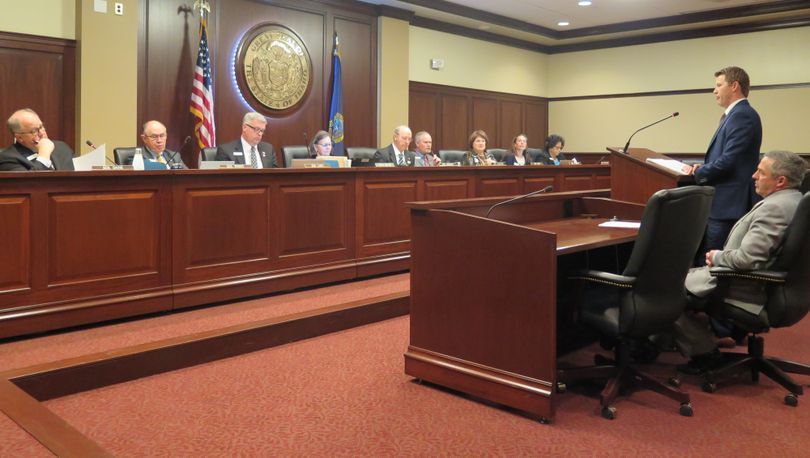Senate panel kills bill to restrict early voting dates

HB 150, the House-passed bill that sought to limit early voting in Idaho counties so that it could occur only from three weeks before an election to one week before, ran into trouble in the Senate State Affairs Committee this morning.
Sen. Marv Hagedorn’s motion to pass the bill died for lack of a second. Sen. Chuck Winder, R-Boise, then moved to send the bill to the Senate’s amending order for changes, to expand it to add another week of possible early voting time for counties; Hagedorn seconded the motion. Sen. Todd Lakey spoke against the motion. “This seems to be more about the convenience for the candidate than for the electorate,” he said. “I don’t like curtailing it. I don’t know if the amending order is the right way to handle this. I prefer to see a more consensus bill come forward if there is one.”
Hagedorn’s motion then died on a 4-4 tie, with Sens. Hagedorn, Hill, Winder and Lodge supporting it; and Sens. Lakey, Stennett, Buckner-Webb and Siddoway opposing it.
“HB 150 improves the early voting in Idaho and provides clarity and consistency to our elections,” Rep. Dustin Manwaring, R-Pocatello, the bill's author, told the committee. “This legislation closes the open-ended start time for early voting. It fixes inconsistencies from county to county.” He said, “It increases local control, because it increases accountability of our county clerks. ... It takes away the opportunity for nefarious action, for them to change early voting opportunities from election to election at their discretion.”
His co-sponsor, Sen. Jim Guthrie, R-McCammon, said few Idaho voters choose to take advantage of early voting more than three weeks before an election. “Keep in mind some counties are staffing this effort for up to seven weeks before Election Day,” he said. “It seems to me those human resources would be better served working on other projects”
Guthrie said, “A lot of legislative districts will overlap several counties. So it can be difficult for a candidate to schedule when fliers go out, when to do advertising on radio, TV, that kind of thing, when the counties start their voting at different times. I have personally knocked on doors and have people say, ‘I voted a week ago.’ ... It can be discouraging, it can be an exercise in futility.”
He said, “The way early voting has gone reminds me of the big sales at Christmas time. … We’ve deviated from that original intent.”
Senate Minority Leader Michelle Stennett, D-Ketchum, told Guthrie, “You had mentioned the continuity for the candidate – this is for the voters. I think that’s where we philosophically disagree.”
She said, “I’ve knocked on thousands of doors, and I frankly just congratulate them when they’ve voted, because any type of voter suppression I discourage.” Stennett said as far as local control, “I’d have to disagree, I think local control is allowing the counties to do exactly what they want to do and they’re doing now. ... I’m having a hard time deciding how this is better.”
Manwaring said 11 counties have been holding more than three weeks of early voting, so just 11 of Idaho’s 44 counties would lose the option to do what they’ve been doing as far as scheduling early voting dates.
Senate Majority Leader Bart Davis, R-Idaho Falls, also had numerous questions for Manwaring about why he structured the bill the way he did and how it would affect the concerns he outlined.
Kathy Griesmyer, policy director for the ACLU of Idaho, spoke against the bill. “Idaho has a very robust early voting system right now,” she said. “It’s one that provides a lot of access for a lot of individuals across the state to participate in our election in a way that best suits their voting needs.”
Tim Hurst, chief deputy Idaho secretary of state, told the panel, “I think people don’t really understand what early voting is. ... It’s really just one more method of absentee voting. … We encourage all counties to do absentee voting as soon as they have the ballots ready.” The difference between early in-person voting and absentee balloting is “just another process” that will “provide better ballot security,” Hurst said, because the ballots don’t have to be folded and placed in an envelope, and instead are submitted in a secure process.
Hurst said, “We brought the early voting legislation not for the campaign, not for the candidates. Our office has some funny idea that the voters are the ones we oughta be catering to or ought to make it easier for.” He added, “We think the counties ought to have the flexibility they need to conduct the election, because they know their needs, they know the situation.”
The bill had earlier passed the House on a 45-24 vote. It was opposed by the Idaho Association of Counties.
